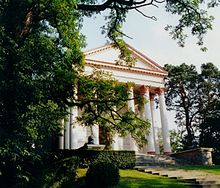Edward Raczyński (politician)
Edward Bernard Maria Graf Raczyński (born December 19, 1891 in Zakopane , † July 30, 1993 in London ) was a Polish diplomat and politician .
Life
Raczyński was the son of Count Edward Alexander Raczyński and his wife Rose (Róża), b. Countess Potocka. The headquarters of the Raczyński , which was founded in 1824 by Friedrich Wilhelm III. had been raised to the hereditary Prussian count, was located in Rogalin ( Province of Posen ) and housed an important art collection. Raczyński studied at universities in Krakow , Leipzig and London and entered the service of the Polish Foreign Office in 1919. From 1932 to 1934 he was Polish envoy to the League of Nations in Geneva and later to 1941 ambassador in London, after which, after August Zaleski's resignation , he was Foreign Minister of the Polish government- in- exile in London until 1943 .
In 1952 he testified in London before the Madden Commission , the US Congress' committee to investigate the Katyn massacre .
For many years in the circles of Polish émigrés in leading positions (including in the Council of Three ), he finally became President of Poland in exile in 1979 and held this office until 1986. He was the last president in exile to hold a high post during the Second Republic . His two successors - Sabbat and Kaczorowski - were 26 and 20 years old, respectively, when World War II began.
Raczyński also worked as a translator of Persian poetry into Polish and in 1960 published his translation of Omar Chayyām's Rubayat . He was married three times: in 1926 with Joyous Markham, heiress of a British "steel baron" family who died early, in 1932 with the Polish noblewoman Cecylia Jaroszyńska († around 1962), who gave him three daughters, and in 1991, 100 years old, with Aniela Lilpop , who came from the well-known Warsaw industrialist family. Through this marriage he legalized a longstanding relationship.
Raczyński received an honorary doctorate from the Jagiellonian University in 1992 .

As the last descendant of his line, Count Edward Raczyński died in London in 1993 at the age of 101 and received a state funeral in his family's crypt church in Rogalin after his body had been transferred to Poland . He had bequeathed Rogalin to the Polish people in a will.
Fonts (selection)
- In allied London. Weidenfels & Nicolson, London 1962
- The British-Polish Alliance, Its Origin and Meaning. London 1948
- The cultural life of Polish exiles in Western Europe. Poets 'and Painters' Press, London 1955
- Czas wielkich zmian. Ed. du Dialogue, Paris 1990, ISBN 2-85316-064-5
- Picturesque trip to some provinces of the Ottoman Empire. Akadémiai, Budapest 1997, ISBN 963-05-6999-X
- Rogalin i iego mieszka'ncy. Rada Miejska, Poznań 1991 (reprint of the London 1969 edition)
- Pani Róza. Poets 'and Painters' Press, London 1969
- W sojuszniczym Londynie. Dziennik ambasadora Edwarda Raczyńskiego 1939–1945. London 1960
- ʿOmar Chayyām: Rubayat (translation into Polish), London 1960
- Edward Raczynski (as Minister for Foreign Affairs in 1942): Note to the Governments of the United Nations "The mass extermination of Jews in German occupied Poland, Note addressed to the Governments of the United Nations on December 10, 1942" published later (30 December 1942) by the Polish Foreign Ministry as a brochure distributed to politicians and the medias: http://www.projectinposterum.org/docs/mass_extermination.htm
literature
- Simon Konarski: Armorial de la noblesse polonaise titrèe. Self-published, Paris 1958.
- Witold Molik: Edward Raczyński 1786–1845 . Poznań, Wydan. WBP, 1999, ISBN 83-85811-66-4 .
- Bohdan Wendorff: Kto jest kim w polskim Londynie. London 1947.
- obituary and short biography by the historian and writer Adam Zamoyski in an article for The Independent of 31 July 1993: http://www.independent.co.uk/news/people/obituary-count-edward-raczynski-1488283.html
Web links
- Edward Raczyński: Bibliography at Litdok East Central Europe / Herder Institute (Marburg)
- A documentary film dedicated to Edward Raczynski
Individual evidence
- ^ The Katyn Forest Massacre US Government Printing Office. Washington 1952, Vol. 4, p. 665.
- ↑ Doktorzy honoris causa , at Jagiellonian University
| personal data | |
|---|---|
| SURNAME | Raczyński, Edward |
| ALTERNATIVE NAMES | Raczyński, Edward Bernard Maria Graf (full name) |
| BRIEF DESCRIPTION | Polish diplomat and politician |
| DATE OF BIRTH | December 19, 1891 |
| PLACE OF BIRTH | Zakopane , Poland |
| DATE OF DEATH | July 30, 1993 |
| Place of death | London |


